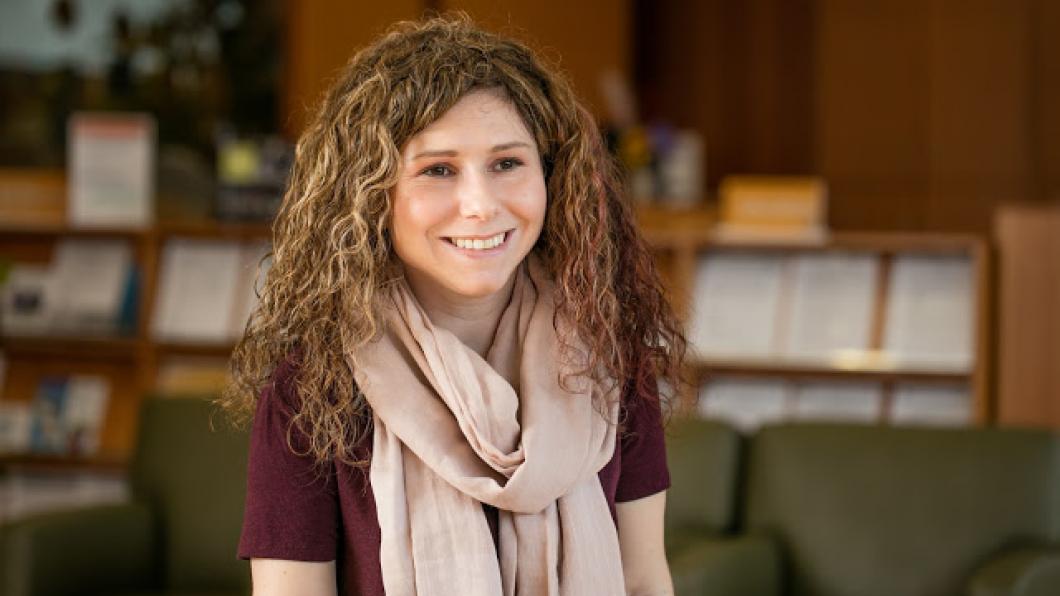
From patient to bioethicist, Dolly comes full circle
By Louise Kinross
I met Dolly Menna-Dack in 1999 when we interviewed her as a youth role model in BLOOM (then called Connections). At age three, Dolly, who has juvenile rheumatoid arthritis, began coming to Holland Bloorview three days a week for therapy. From age eight to 12 she came every day for school and therapy. At 12 she spent eight months here as an inpatient following surgery. “Greg Steffler taught me to drive a stretcher, known as a ‘banana cart,’ which is even more difficult than driving a car,” she says. At 16 she was a member of our first youth advisory council, and volunteered for many years throughout the hospital. For eight years Dolly worked as a youth facilitator in our LIFEspan clinic supporting youth who are transitioning to the adult world. Last summer Dolly graduated with a master’s in health sciences in bioethics. In February she was hired as Holland Bloorview’s clinical bioethicist.
BLOOM: How did you get into the field of ethics in children’s rehab?
Dolly Menna-Dack: I have arthritis and because of that I was personally involved with the health-care system from a very young age. I started off my university career in human biology, planning to go to medical school. But then I discovered I was really interested in how we make healthcare decisions.
I wanted to help kids and youth understand that they can participate in discussions and be empowered to make decisions about their healthcare.
I’ve always wanted to be a support system for children and youth as they think about those big health-care decisions.Most kids don’t make decisions on their own, they make them with family, friends and the health-care team. The pediatric health-care team is like a long-term member of the family, and disability isn’t something to be fixed or figured out, it’s to be explored and understood together.
BLOOM: What was it like when you came here as a three year old?
Dolly Menna-Dack: My first memories all centre around the old Pat pool and the rainbow over the pool. My first memories include Joan Ferguson, who was my first physiotherapist [and later our vice president of programs and services]. From Grade 3 to Grade 7 I came here every day for therapy and school. It was like home. It was always a part of my normal and was never strange.
BLOOM: Did you identify any ethical issues here as a child?
Dolly Menna-Dack: I could see that not all of my friends that came for regular therapy knew as much about their health care as they could have. I recognized that my mom had been making an effort to make sure I listened and was present during conversations. My friends that didn’t have disabilities knew even less about their health. They didn’t put any thought into answering ‘How are you?’ For kids with disabilities, ‘How are you?’ is an evaluation. You’re evaluating what type of answer you’ll give and how that answer may impact your day. If I say ‘I have pain’ or ‘I’m not feeling well’ or ‘my splints are hurting’ that can change what I do that day.
BLOOM: What are common ethical issues in children’s rehab?
Dolly Menna-Dack: An example of a common issue is consent and capacity. It’s really about when a clinician proposes a treatment or a plan to a family, they’re tasked with evaluating if the child understands and appreciates the consequences of the options given to them.
There can be times when the child and family may disagree about the course of action, or the child and team disagree, or the team members disagree among themselves.
BLOOM: It sounds very black and white—that either a child is capable of making decisions or not—whereas it seems like there would be a lot of grey area.
Dolly Menna-Dack: Kids need to be a part of the discussion, whether or not they’re making the decision. The beauty of pediatrics is the dance of assent—of ensuring that a child is enrolled and empowered to say when they’re not sure about the treatment. We want to encourage children and youth to express what their concerns are so they can be better prepared. They need to participate.
BLOOM: I can’t really ask you about your typical day as bioethicist as you're only just starting.
Dolly Menna-Dack: A big part of my role will be providing ethics education for staff and the Holland Bloorview community, leading the bioethics forum and ensuring teams have someone who is easily available to them to talk about ethical issues. My plan is to engage staff to highlight how ethics can support them when they encounter moral distress. I want them to view ethics as something that will help them help clients and families.
The important lens I’m bringing to this role is multi-faceted and grounded in my experience being a user of the health-care system in pediatrics and adult care. I've also worked with clients and families for many years both here and at Toronto Rehab. I believe that’s going to guide my work and make me relatable to our clients and families. It’s a rare gift to understand the roles of everyone who may wish to have the support of a bioethicist.
As Dolly is just starting her bioethicist job, we'll check back in six months to learn more about what happens in a typical day.